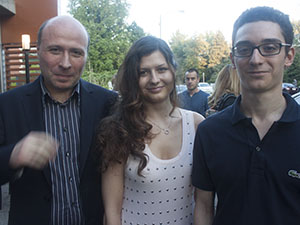Background and Start of Coaching Career
Interview by Alisa Melekhina
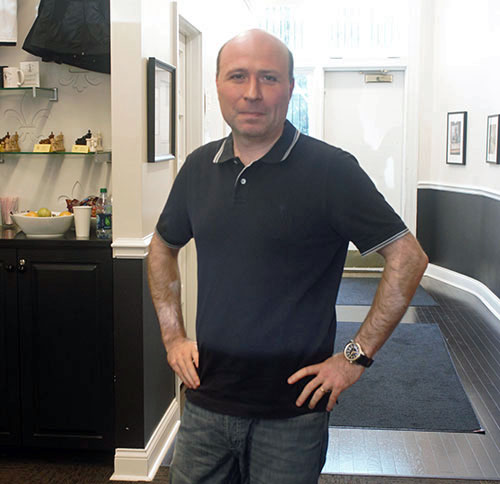
Grandmaster Vladimir Chuchelov was born in Moscow, Russia in 1969. His first trainer was famous Moscow trainer Victor Cherniy, who celebrated his 70th birthday with aparachuting jump. Upon getting involved with chess, his permanent trainer became Abram Khasin (pictured below).

Abram Khashin (in Dortmund 2004), one of Russia’s top trainers, and a very
remarkable personality who is still active chess, following his 90th birthday!
Chuchelov’s training career began in 2002. He was invited by Jeroen Piket – one of best players in the Netherlands – for a session before Wijk Aan Zee. Chuchelov has continued to second a variety of players for that tournament for thirteen consecutive years.
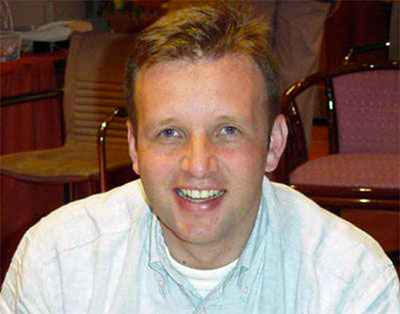
Jeroen Piket left chess a year after working with Chuchelov to work
for the famous chess mécénat Joop van Oosterom in Monaco
The following year, Chuchelov was invited by another top Dutch player, Loek van Wely, to help with preparations for the 2003 Wijk Aan Zee tournament. For Loek it was traditionally a very difficult tournament. But five weeks of preparation before the tournament were rewarded.
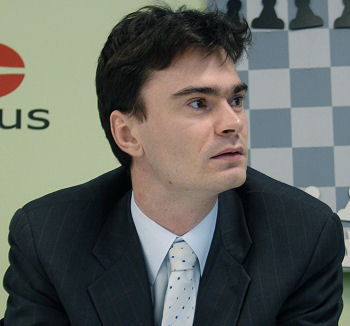
Van Wely was leading the 2003 Wijk Aan Zee tournament all the way, and despite unfortunate loss of both games to Karpov and Kramnik in the final rounds finished on a plus score (he was +3 at one point).
At this point, Chuchelov was still an active chess player himself. “I was definitely not the top, but decent grandmaster from the top 100.” However, he noticed that the immense work devoted to his training sessions with his students could be seen immediately. The “analytical part of chess was more exciting than playing itself.”
The Dutch Federation noticed the success of his training sessions, and asked him to work with young students. As demand grew, by 2008 he became the head coach of the Dutch Federation. Chuchelov soon realized that “being a Grandmaster was not enough. I had to constantly work on my training materials.” It was a good time to fully focus on a professional trainer career. I took a “top-down approach in training. My goal was to project top-level chess to build up on the young students’ foundations. It was helpful for me to work on both levels simultaneously.”
Alisa Melekhina: Did you consider applying your training methods to improving your own chess?
Vladimir Chuchelov: Unfortunately, it was too late. I actually realized that in fact I was never a real professional player. Being "professional" requires a totally different set-up and approach to training. I had only a very vague idea at that time.
AM: What is your method to improving your students' chess?
VC: It always starts with a 60-hour course called "Strategic balance." All my Students are familiar with it. Then we begin routine work such as analyzing games, working on your opening repertoire, and having calculation sessions. You have to be focused, motivated and willing to work hard. Learning to work efficiently is what counts the most. There is no one formula for success – it depends on each individual player. Everyone has different weaknesses that must be tuned.
By “focus,” do you mean that one must study solely chess?
Not necessarily, but when you are studying chess, you must focus purely on chess. It cannot be half-half. Only then you can be efficient.
How did you begin working with Fabiano Caruana?
I met Fabiano’s father (Lou Caruana) during the 2010 European Championships. I was there with another of my star students, Anish Giri. There were not many spectators and while waiting for the end of the round, I talked to Fabiano's father occasionally. A few weeks later I got an invitation to come over to Lugano, Switzerland. It seemed that Fabiano enjoyed the training sessions. However, Fabiano was not very trusting of a new trainer, so I had to prove my authority. In the end, it worked out well. At first, I assisted him only at major tournaments, but for the past two years I have assisted him at nearly all of them.

Chuchelov and Caruana have been a powerful team since 2010. Photo Credit: Alisa Melekhina
How did you prepare for the Sinquefield Cup?
We did not have much time to prepare because Fabiano played in Dortmund, followed by the Olympiad. We had a few sessions on Skype untill he caught a cold. Regardless, we work the entire year, so it is not important.
What was the impact of playing in two major tournaments before the Sinquefield Cup?
It’s not that it hurt or help in any particular way. It turned out that the nice novelties and pearls discovered even in previous years, his fantastic form, the Ice Bucket Challenge!... It all came together in this tournament. Already, three games were essentially won in the opening:
- against Vachier-Lagrave in round two – it was the g4 move in the Caro;
- the Na2 idea against Aronian in round four;
- and against Topalov in round six the powerful move 13. Re2 was missed by Topalov’s team in his preparation, according to the Bulgarian. Topalov was very upset about this.

Topalov was one of the victims of Caruana's prep. Credit: Lennart Ootes
Then what happens is that opponents start to worry about falling into prep, and start to deviate. But when they deviate, they are also not so comfortable. The cycle continues from there. It has to be said that the "new" Fabiano began in Dortmund, already there he was hardly making mistakes, demonstrating powerful play. Usually I’m very critical and try to keep him sharp with advice, but recently he hasn't provided many occasions for me to be unhappy.

MVL - Caruana, round 7 of the Sinquefield Cup. Photo Credit: Lennart Ootes
How do you decide which openings to focus in on when a field as strong as this can play anything?
After many years of following opponents, you can sense what they can do and what they can’t. You also notice trends. I of course follow their careers, and I expect that they check what their opposition is doing.
Describe the preparation process between you and Fabiano.
There is some misconception about preparation at the top level. It doesn't have to be long it has to be efficient, right to the point. Of course it doesn't always go that way, but it is the right direction, less is always better. This wisdom I managed to pick up still making my first steps, working with Loek Van Wely. It has to be balanced. A player needs to preserve energy for the game, do not prepare for one game as for three.
Do you have a routine for the tournament?
In the evening after the round we try to relax, maybe go for a walk and discuss the game, thinking about what is next, what our options are for the next game. In the morning we work for 2 - 2.5 hours, then have lunch and the round starts. Time passes quickly at these events.
While watching the games live, what is going on in your mind?
I try to keep a distance and not to get involved, but it's not that easy.
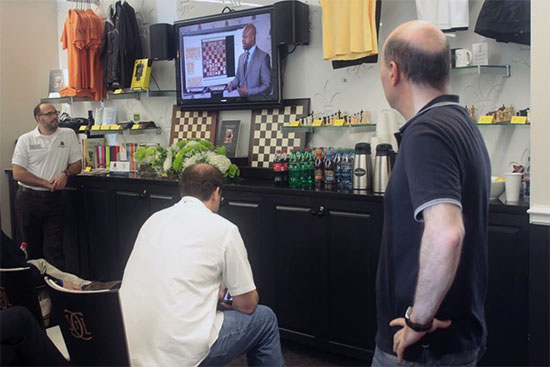
Chuchelov trying to stay calm during Caruana's game. Photo by Alisa Melekhina.
Which point in the tournament had you most worried during one of Fabiano’s games?
After Fabiano won his fifth game in a row, I was worried that he would have a stroke of happiness. The result is a little bit unrealistic. But once the second half began the same, I figured he must have gotten used to it.

Fabiano with a stroke of happiness after going perfect in the first half of the event. Photo by Lennart Ootes.
Why is Fabiano steamrolling through the field? Are they playing differently against him?
I don't think so. It seems to be a perfect coincidence.
But it requires more than a coincidence to reach 7/7?
Yes, it’s a really impressive result. Almost unreal, I would say. It's all about the momentum.
On another hand, let's have a brief look on the role of the other players:
Topalov showed very good shape during the Olympiad, yet here he began his tournament losing both games, clearly struggling. Similarly, Vachier-Lagrave was demonstrating confident play recently, but here he felt insecure from the start. Hikaru is playing very shaky, surely not his tournament. Magnus got a plus score, but missed many chances along the way.
On the contrary, Fabiano played nearly flawlessly. So maybe it is not entirely a coincidence.
Are Fabiano’s opponents affected by the pressure to beat the tournament leader?
It’s 50/50. On the one hand, they’re under pressure. On the other, they must realize that Fabiano’s performance is unrealistic and think that it must stop somewhere. So they may think that they’re the game to end the streak.
Fabiano is always so composed in front of the cameras. Is he excited about his performance?
It is a different atmosphere when the cameras are off. We’re having fun, let’s say.
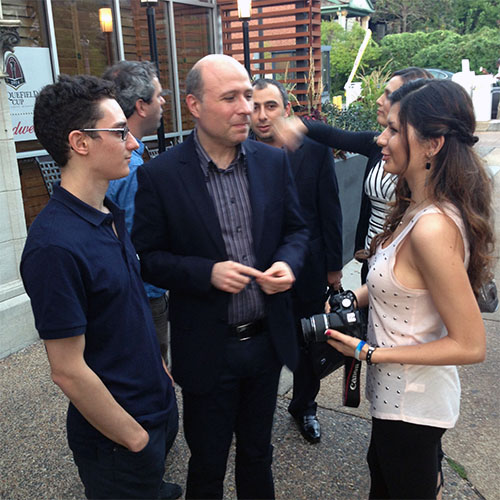
Fabiano certainly looks more relaxed with the stress of the tournament over. Photo by Sam Thompson.
What is up next for Fabiano?
He is playing in Bilbao after this. There is also the Grand Prix series in Baku, Tashkent, and London.
Many people believe that Fabiano is the next World Champion contender, especially after the unprecedented performance here. What are your thoughts?
We'll see. Let's wait for the next World Championship cycle.
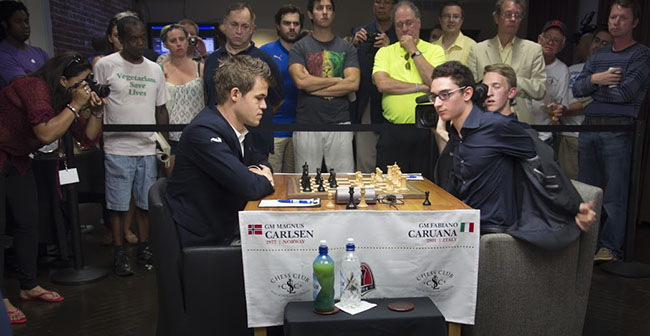
A preview of a future World Championship match? Photo Credit: Lennart Ootes
